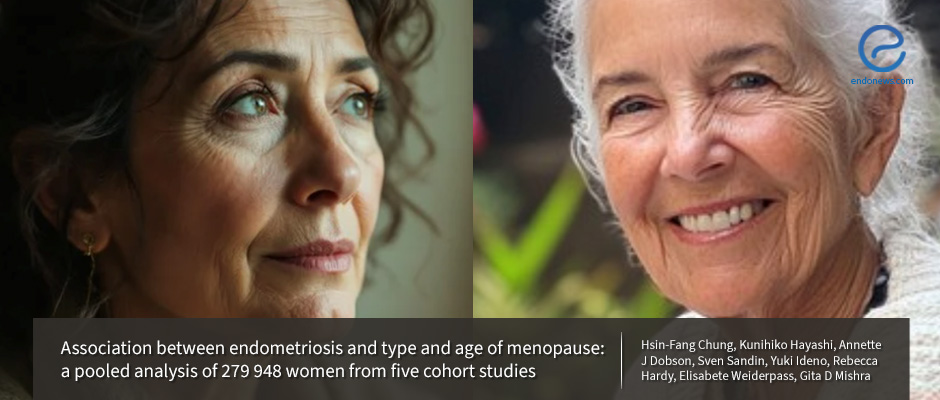Surgical vs. Natural Menopause in Endometriosis
Jun 13, 2025
Landmark Study Shows 7-Fold Risk of Surgical Menopause in Endometriosis
Key Points
Importance:
- Women with endometriosis face elevated risks of both premature menopause and surgical menopause, both of which are linked to adverse long-term health outcomes.
- This large pooled study aims to clarify the average timing and type of menopause associated with endometriosis, a question previously understudied.
Highlights:
- Bilateral oophorectomy, often used in surgical management of severe endometriosis, significantly contributes to early loss of ovarian function.
- Long-term hormonal treatment and conservative surgical planning are increasingly emphasized to delay menopause onset in affected women.
What's done here:
- Researchers analyzed data from five large international cohort studies (Australia, Japan, UK) between 1996 and 2022.
- Study population is 279,948 women, of whom 10,367 (3.7%) had self-reported endometriosis.
- Outcomes included type of menopause (natural vs. surgical) and age at menopause, categorized as:
- Premature (<40) / Early (40–44) / Reference (50–51)
- Covariates: Age, BMI, smoking, education, parity, and infertility.
Key Results:
- Women with endometriosis had a 7.5-fold higher risk of surgical menopause (HR 7.54; 95% CI 6.84–8.32).
- They were less likely to undergo natural menopause (HR 0.40; 95% CI 0.33–0.49).
- Mean age of menopause was:
- Surgical: 45.2 years-endo vs. 47.6 for no endo
- Natural: 49.9 years-endo vs. 50.5 years for no endo
- Endometriosis was significantly associated with both premature surgical menopause and premature natural menopause.
- Infertility and nulliparity modestly mediated the risk but did not fully explain the associations.
From the Editor-in-Chief – EndoNews
"This landmark study reminds us that the consequences of endometriosis extend well beyond pain and fertility—it fundamentally alters the reproductive lifespan. A sevenfold increase in surgical menopause risk, along with earlier natural menopause, are not subtle signals. These findings demand integration into long-term care strategies: regular assessment of ovarian reserve, deliberate surgical decision-making, and timely hormonal intervention. Evidence like this should reshape both clinical guidelines and the way we counsel patients—toward a future where preserving ovarian function becomes central, not secondary."
Lay Summary
Endometriosis is a chronic, progressive inflammatory disease that causes pelvic pain, painful menstruation, painful intercourse, and infertility. In many cases, surgery is considered due to persistent symptoms, resistance to medical therapy, or invasive disease progression. However, both the disease and its surgical management—particularly procedures like hysterectomy or oophorectomy—can accelerate ovarian failure and lead to early or surgical menopause.
A new study led by Dr. Susan R. Chung and colleagues from The University of Queensland analyzed data from five major international cohort studies to examine how endometriosis influences the timing and type of menopause.
The data came from nearly 280,000 women, including 10,367 with endometriosis, across cohorts from Australia, Japan, and the UK. Researchers compared rates and ages of natural versus surgical menopause between women with and without endometriosis. The findings were striking:
-
Women with endometriosis were seven times more likely to undergo surgical menopause.
-
On average, surgical menopause occurred 19 months earlier, and natural menopause 5 months earlier, compared to women without endometriosis.
-
These women were also twice as likely to experience premature menopause (before age 40), either surgically or naturally.
The authors emphasize the importance of understanding the biological mechanisms behind endometriosis-related ovarian decline. Early diagnosis and tailored management—including medical therapies even after hysterectomy—may help delay menopause, improve quality of life, and reduce the long-term health risks associated with early loss of ovarian function.
This large pooled analysis was recently published in Human Reproduction.
Research Source: https://pubmed.ncbi.nlm.nih.gov/40304605/
surgical meopause natural menopause early menopause premature ovarian insufficiency endometriosis.

